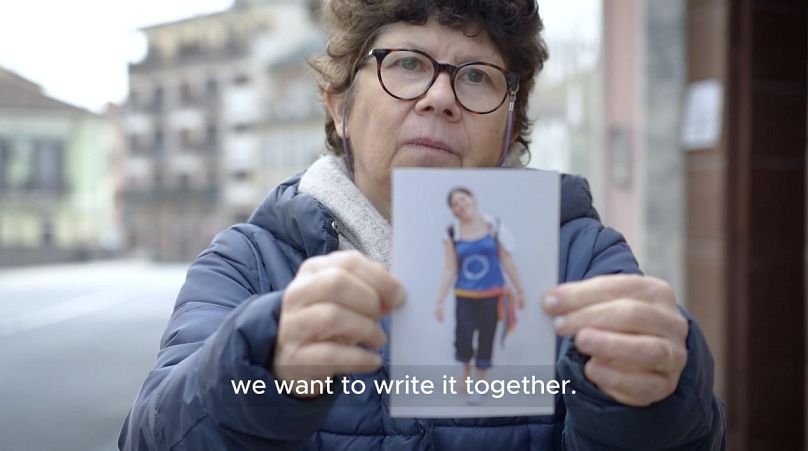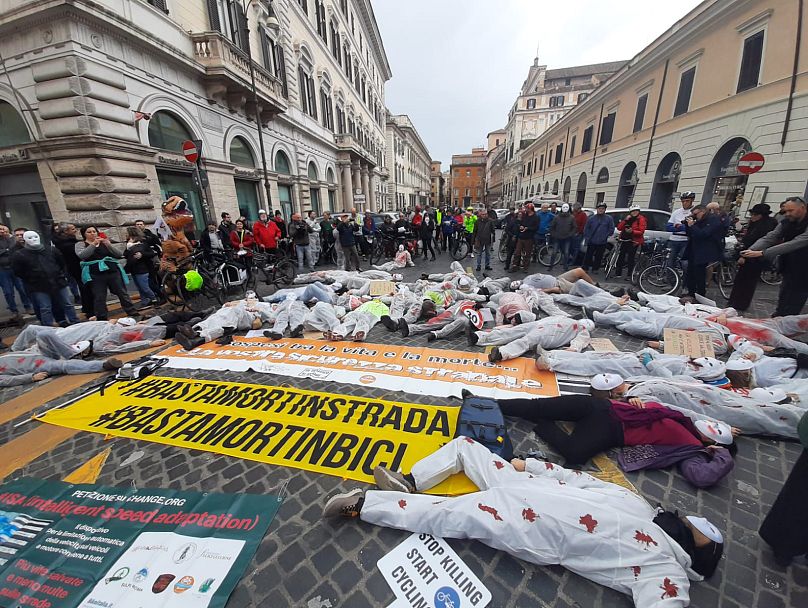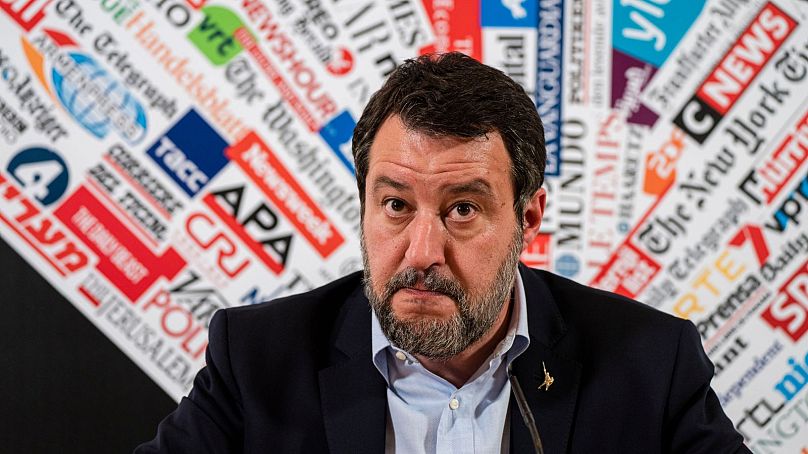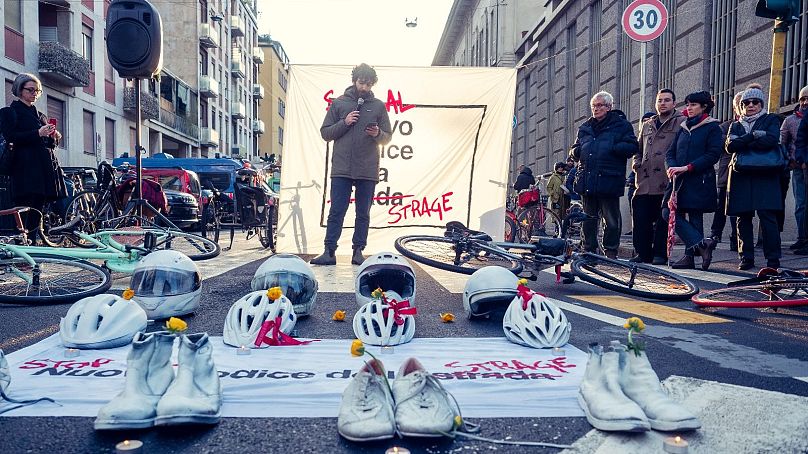Climate campaigners and bereaved families are urging the government to scrap a ‘backwards’ road code reform.
Italian MPs are voting on a new law that campaigners say undermines the country’s climate commitments, while doing nothing to reduce its high number of traffic fatalities.
 ADVERTISEMENT
ADVERTISEMENT
 ADVERTISEMENT
ADVERTISEMENT
Around 3,000 people are killed on Italy’s roads every year, at an above-EU-average rate of 52 lives lost per million inhabitants.
Matteo Salvini, leader of the far-right Lega party and transport minister in the Meloni administration, has proposed a reform of the traffic road code.
It’s ostensibly aimed at making Italy’s roads safer. But the Clean Cities campaign group - backed by Europe’s Transport & Environment (T&E) collective - claims the government is using the issue as an excuse to attack sustainable mobility measures.
“The reform is clearly grounded in a culture war that the government is waging on anything that they feel might be somehow linked to a green agenda,” Claudio Magliulo, head of Italy’s Clean Cities Campaign tells Euronews Green.
If passed by Parliament, the reform will limit mayors’ ability to create new cycle routes or car-free ‘school streets’, or to keep polluting cars out of city centres.
“Even if this sounds like a very specific national Italian thing, it is actually a piece of a much larger puzzle,” says Magliulo. “And that's why we need to pay attention.”
Campaigners held demonstrations in dozens of Italian cities last week, calling for the reform to be scrapped and re-written in consultation with bereaved families.
Final voting in Italy’s lower branch of Parliament has been delayed until 26 March.
Why are bereaved Italian families against the road code reform?
Salvini’s overhaul of the highway code would toughen up some rules. Those convicted of drink driving would see their jail time extended, for example.
But critics say the reform risks increasing the main factor in road mortalities: speed.
Lucia Pozzi was 17-years-old when she was hit by an SUV driver travelling at an “absurd speed” on Christmas night in Melegnano, near Milan. She died almost instantly.
20 years later, her parents are passionate advocates of road safety and education. Angela Bedoni and her husband Paolo Pozzi are against Salvini’s reform, “because its architecture focuses on repression rather than the prevention of mortal collisions.
“In fact, most of the text is focused on the types of collisions that have a large echo in the media, such as when the person responsible was under the influence of alcohol or drugs, but which only amount to five per cent of total road killings.”
One of the changes would enable the government to increase speed limits on highways, despite research showing that additional deaths can be expected with every km/h increase.
“I feel very let down,” says Emanuela Bottardi, who lost her mum Anna to a road collision in 2008. “If the families of the victims had really been listened to, the reform would have addressed speed as the first and foremost factor in road deaths.”
How would Italy’s road code reform impact green policies?
So what is the road code reform really about? According to Magliulo, “It's clear that this is a very car-centred government that somehow has decided they want to stop the green transition.”
The reform will curtail the power of mayors to enact green policies, he explains. They won’t be able to introduce Low Traffic Neighbourhoods or Low Emission Zones; even a 200-metre cycle lane or school street will be subject to ministerial approval, which is notoriously unforthcoming.
Mayors will also find it harder to sanction violations of the road code. For instance, one change means a car could enter a pedestrian area multiple times a day and be fined only once.
“You can see how this could really be the gateway for a complete undermining of some of the policies that are instrumental in transforming our cities into places where people are actually safer to move around,” says Magliulo.
On a personal note, the 38-year-old Bologna-based campaigner has been biking far less since becoming a father - one of many Italians deterred by a lack of safe cycle routes.
This is a real problem, since transport is the biggest source of emissions in the EU, with petrol and diesel-burning cars responsible for a 40 per cent share of the pollution.
Italy was promised €34 billion funds from the EU’s Next Generation pot towards sustainable mobility projects, some of which campaigners warn are now jeopardised by the reform.
Has sustainable mobility been improving in Italy?
“Italian mayors are kind of the last to the party in Western Europe,” says Magliulo. But since the COVID-19 pandemic, they’ve been paving the way for active and sustainable mobility.
Bologna became the first major Italian city to bring in a 30km/h speed limit earlier this year. Salvini fought Mayor Matteo Lepore all the way, says Magliulo, with weeks of ongoing arguing on newspaper pages.
In Milan, an ordinance forcing buses and lorries to install blind spot sensors in a bid to reduce cyclist deaths met with similar kickback from the transport minister last year.
“We think it's crucial that local authorities have the leeway to try stuff out, and implement in Italian cities models that have been successful in other [European] cities,” says Magliulo. He points to the examples of cycle-friendly Amsterdam, Rotterdam and Ghent; Spanish cities that have brought in speed limits; and London’s LEZs.
Instead, mayors’ hands “would be tied behind their back when it comes to urban mobility.”
Magliulo also highlights the irony of Salvini’s party - previously called Lega Nord (Northern League) and dedicated to regional autonomy - now trying to centralise decisions while in power.
Andrea Casu, MP for the main opposition party Partito Democratico, says the government is carrying on “an absurd crusade against the powers of mayors, against cycling and sustainable mobility.”
"Instead of strengthening local public transport in crisis by using at least part of the 22 billion euro we spend every year on environmentally harmful subsidies, Minister Salvini writes a Road Code that looks to the past rather than the future of mobility,” he tells Euronews Green.
What is next for Italy’s road code reform?
Voting on the road code reform was due to conclude on 21 March, but has been delayed until Tuesday after numerous interventions by opposition MPs.
If it passes in the lower branch of Parliament, the Chamber of Deputies, the bill will then pass to the Senate. Italian law states that the two branches must agree on the exact same text. So if the Senate has even small revisions, the bill will return to the Chamber of Deputies.
Campaigners are making as much noise as possible to obstruct its course. Demonstrations took place in more than 40 cities last week, from Genoa to Naples, demanding the reform be put on hold.
An open letter signed by more than 360 mobility experts and urban planners was also sent to the transport ministry this month under the ‘Stop the Street Code’ banner. And thousands of people have been calling the government or ‘mail bombing’ Meloni with their objections.
Is this part of a wider European culture war against sustainable mobility?
With EU elections around the corner, Magliulo sees a connection to Salvini’s drive to push this reform through, positioning Lega as the party applying law and order to road traffic.
But urban mobility is no small issue being co-opted for political gain. It is a critical piece of Europe’s green transition, and civil society is watching.
“We are very concerned that this might be just the beginning,” says Magliulo. “As it often happens, Italy is a trendsetter in Europe. In most cases people don't realise that until it's too late. So stuff happens in Italy and then a few years later, it also happens in other places where it may have been unthinkable a decade before.”
After Spanish local elections last year, victorious right-wing politicians immediately reversed the sustainable mobility policies of their predecessors. Magliulo worries this is a “first alarm” for what is happening in Italy, with the reining in of mayors’ green powers.
“When the European Union is not a climate leader anymore, because its national governments are not climate leaders anymore, because its politics have shifted completely, then that becomes a major global issue,” he adds.














